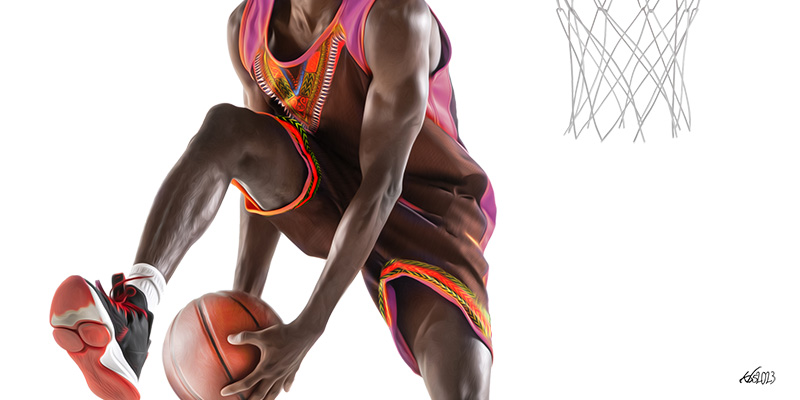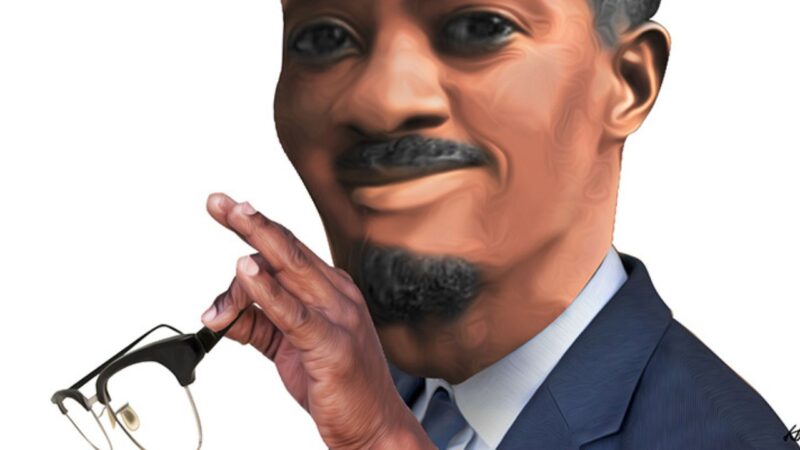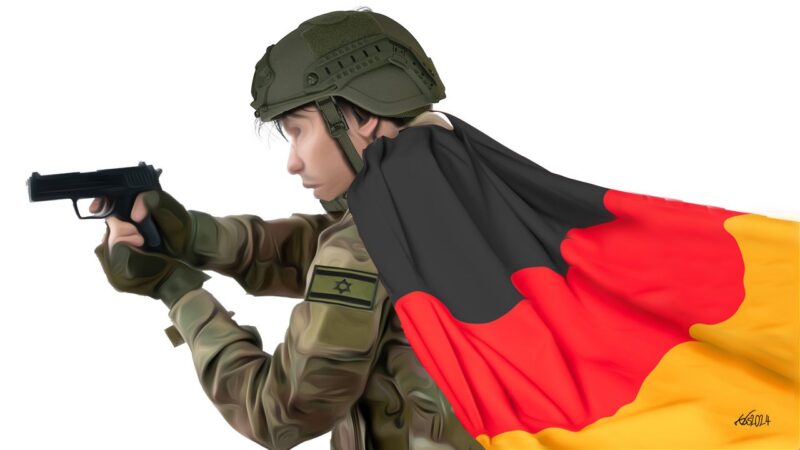Cameroonian-born Philadelphia 76ers centre Joel Embiid won his first NBA Most Valuable Player (MVP) award on 3 May 2023, beating Giannis Antetokounmpo (born in Greece of Nigerian parents) and Nikola Jokić . Embiid, also known as “The Process”, has led the 76ers to an NBA playoff semi-final against the Boston Celtics, where they’re competing for the Eastern Conference title. He’s a six-time All-Star and was the first international player to win an NBA scoring title, averaging 30.6 points per game. Embiid took up basketball after being recruited by Luc Mba a Moute (former NBA player, now scout and manager), and flew to the US from high school to join the NBA.
Embiid’s award is a major accomplishment for Africa, and it affirms the growth of the game on the continent. In recent years, there has been a surge in the popularity of basketball in Africa, and more and more African players are making their mark on the NBA. Embiid is just one example of the many talented African players who are now playing at the highest level of the game.
Homage to Africa
In February this year the NBA showcased an All-African ensemble during its halftime show featuring some of Nigeria’s biggest music acts like Grammy-award winner Burna Boy, Tems (2023 Grammy Award winner), and Rema. The theme paid homage to African players in the league, reflecting the growing popularity of basketball on the continent, considered by the FIBA and the NBA as the last frontier for the sport.
In the same month, South Sudan’s men’s basketball team led by former NBA star Luol Deng became the first African team to qualify for the FIBA World Cup, beating Senegal in their final qualifying game. With a rich basketball heritage, both locally and internationally, South Sudan’s team The Bright Stars has combined its talents to become an emerging powerhouse in East Africa, demonstrating the results of focus, determination, and grit for a national team.
The game of basketball has increasingly become popular in Africa with more kids playing from a young age. This is through schools’ tournaments at primary and higher learning institutions across the region. As of writing this piece, NBA has developed the NBA Junior programme targeting younger players in different countries in Africa. The expansion by the International Federation of Basketball (FIBA) and the NBA counts Africa as the last frontier of the game—both in terms of player development and also in terms of market and audience for the game.
History of basketball in Africa
Basketball began to spread across Africa in the mid-20th century, particularly in countries that had been colonized by France—such as Côte d’Ivoire and Senegal. Missionaries and administrators introduced the game to the rest of the continent and soon African countries were competing in international tournaments. The Pharaohs of Egypt joined FIBA in 1934 and represented Africa in the 1937 Eurobasket tournament in Latvia. The first recorded international game in Africa was between the American and Egyptian teams in 1949, the same year that Egypt hosted and won the Eurobasket49 tournament against European basketball powerhouses Greece and Turkey.
As African countries gained independence in the late 1950s and early 1960s, they looked to integrate with the global community. In June 1961, 12 African countries founded the Association des Fédérations Africaines de Basketball (AFABA) at the Consultative General Assembly held in Cairo, Egypt. AFABA became the umbrella body for the game of basketball on the continent, and Abdel Moneim Wahby, a former player, referee, and administrator in the Egyptian Basketball Federation, was elected as its first president. The Afrobasket tournament was born in 1962 under AFABA, serving not only as a competition but also as qualification for both the Olympic Games and the FIBA World Cup.
In the 1980s and 1990s, basketball continued to grow in Africa, with more countries participating in international competitions and more African players competing in the NBA. The African Basketball Confederation was established in 1989 to further promote the sport on the continent. Nigerian-born Hakeem Olajuwon was drafted by the Houston Rockets in 1984, along with future Hall of Famers Michael Jordan and Charles Barkley. Olajuwon won two NBA championships and MVPs in 1994-1995 and had the popular “Dream Shake” movement under the basket. Sudan (before South Sudan’s independence) also produced Manute Bol—at 7 feet 7 inches one of the tallest basketball players ever—who ended up with more blocked shots than points.
The Afrobasket tournament was born in 1962 under AFABA, serving not only as a competition but also as qualification for both the Olympic Games and the FIBA World Cup.
Playing on the defensive side of the game was Congolese-born Dikembe Mutombo who was in the game between the 1980s and the early 2000s. He was part of the pioneering African players in the NBA and continues to support the expansion of the game in Congo DRC and the rest of Africa.
In 1995, the top brass at AFABA resolved to revamp the association to reflect the changing nature of the game; it had grown to over fifty members from an initial membership of twelve member countries. A new Secretary-General, Alphonse Bile from Cote d’Ivoire, was elected in 2002 with the mandate of modernizing the organization. This started with a change in name from AFABA to FIBA Africa. The body also divided the member countries into 7 Zones—with the smallest, Zone 1, comprising four country members and the largest, Zone 5, having 11 countries.
Grassroots development of the hoops
The game of basketball has been growing in popularity in Africa for many years, and there are now a number of grassroots initiatives that are helping to develop the sport on the continent.
One of the most important of these initiatives is Basketball Without Borders (BWB), a program that was launched by the NBA and FIBA in 2001. BWB brings together top young basketball players from around the world for training camps, where they can learn from NBA players and coaches. The program has helped to develop some of the best basketball players in Africa, including Joel Embiid, Pascal Siakam, and Luc Mba a Moute.
Another important initiative is Giants for Africa, a project that was launched by Masai Ujiri, the first African president of an NBA team (the Toronto Raptors). Giants for Africa is building 100 basketball courts across Africa in an effort to improve access to the sport and encourage more young people to play.
The game of basketball has been growing in popularity in Africa for many years, and there are now a number of grassroots initiatives that are helping to develop the sport on the continent.
In addition to these major initiatives, there are a number of smaller grassroots organizations that are working to develop basketball in Africa. These organizations provide training, equipment, and other resources to young players, and they help to organize tournaments and leagues.
The growth of basketball in Africa is a positive development for the sport. It is helping to create new opportunities for young people, and it is also helping to promote peace and understanding across the continent. Here are some additional details about the initiatives mentioned above:
Basketball Without Borders (BWB) has held camps in 30 countries around the world, including 10 in Africa. The program has helped to develop over 500 players who have gone on to play professionally, including 15 NBA players including current NBA MVP Joel Embiid, Pascal Siakam (2019 NBA Playoffs winner), Luc Mba a Moute, Moussa Diabate to name but a few.
Giants for Africa has built 50 basketball courts in Africa so far, with plans to build 50 more. The organization has also provided training and equipment to over 10,000 young players.
Grassroots Africa Basketball which provides training and equipment to young players in Nigeria. The organization has helped to develop over 1,000 players.
Power Forward Programme: Power Forward Programme provides training and equipment to young players in Nigeria. The organization has helped to develop over 150,000 players.
Hoops Dreams Africa provides training and equipment to young players in Southern Africa. The organization has helped to develop over 10,000 players.
These are just a few of the many grassroots initiatives that are helping to develop basketball in Africa. The growth of the sport in Africa is a positive development for the continent, and it is sure to continue in the years to come.
In 2022, a record eight players of African origin were selected in the NBA Draft. This is a testament to the growth of the game in Africa, and it is a sign that the continent is producing some of the best basketball players in the world. As the game continues to grow in Africa, it is likely that we will see even more talented players from the continent make their mark on the NBA in the years to come. Currently there are over 70 players either born in Africa or born of parents of African origin: Nigeria has 30 players, Senegal 12, Cameroon 6, and the Democratic Republic of Congo 5, to mention but those.,
African basketball leagues
Basketball is booming in Africa and the continent is home to some of the fastest-growing basketball leagues in the world, its players increasingly making their mark on the NBA.
In Angola, the Angolan Basketball League is one of the strongest and most competitive in Africa. The league is home to several top teams, including Primeiro de Agosto, Petro de Luanda, and Recreativo do Libolo. In Egypt, the Egyptian Basketball League is another strong league. The league is home to several top teams, including Al Ahly, Zamalek, and Al Ittihad. In Senegal, the Nationale 1 Masculin is the top men’s basketball league. The league is home to several top teams, including AS Douanes and ASFA. In Uganda, the National Basketball League is one of the fastest-growing leagues in Africa. The league is home to several top teams, including City Oilers and Falcons.
All these teams regularly compete for domestic and continental titles, and they have also produced a number of NBA players, including Alaa Abdelnaby of Egypt, Carlos Morais of Angola and Gorgui Dieng of £Senegal.
In South Africa, the Basketball National League is the top men’s basketball league. The league is home to several top teams, including Cape Town Tigers and Jozi Sonics. These teams regularly compete for domestic titles, and they have produced several NBA players, including Thabo Sefolosha. Thanks to its local media partner SuperSport, it has enjoyed consistent media coverage, complimenting the NBA’s viewership on ESPN and other terrestrial media. In 2015, the country hosted the first NBA exhibition game pitting an All-Star Team Africa vs Team World.
Morocco and Tunisia also have well-developed basketball leagues. These leagues are home to several top teams, and they have produced several NBA players, including Salah Mejri and Radhouane Boualga.
The continent is home to some of the fastest-growing basketball leagues in the world, its players increasingly making their mark on the NBA.
With the increasing popularity of the NBA in Africa, the growth of basketball in Africa continues apace. The NBA has been broadcasting games in Africa for several years, and the league has also held several exhibition games on the continent, helping to raise the profile of basketball in Africa and inspiring young people to play the game.
Another factor that has contributed to the growth of basketball in Africa is the development of local leagues that provide young players with the opportunity to develop their skills and to compete against top players. As the local leagues have improved, so too has the quality of African players.
Basketball Africa League comes alive
In 2019, FIBA and the NBA announced the launch of the Basketball Africa League (BAL). The League features 12 teams from 10 countries, with a qualifying round of 32 countries pre-tournament. It operates under the NBA Africa as a subsidiary of the NBA, along with private investors such as former US President Barack Obama, Nigerian businessman, Babatunde “Tunde” Folawiyo, Helios Fairfax Partners Corporation (HFP) and former players such as Dikembe Mutombo, Junior Bridgeman, Luol Deng, Grant Hill, Joakim Noah and Ian Mahinmi.
The NBA named Amadou Gallou Fall as its inaugural president. His association with the game is long-standing; the Senegalese native joined the NBA in 2010, opening the league’s first office in Johannesburg, South Africa. He has worked on many initiatives and directed the NBA’s grassroots basketball development and partnerships with marketing, media and consumer product companies in Africa. They include the Junior NBA, Basketball Without Borders (BWB) Africa and The NBA Academy Africa.
Back to the BAL: 2023 will be its third season providing a platform for African players to showcase their skills and helping to raise the profile of basketball in Africa. It also gives scouts from other leagues across the world an opportunity to view and recruit talent.
The league has also created new opportunities for coaches, referees, and other basketball professionals on the continent. The BAL has plans to expand in the coming years, with the goal of eventually having teams from all over Africa competing in the league.
The NBA is also considering holding pre-season games in an African city with plans coming forward as early as 2024.
Future of the game?
The continent is home to a growing number of talented players, and the game is becoming increasingly popular. One factor is the increasing availability of basketball infrastructure. More and more basketball courts and gyms are being built across the continent, and this is providing young people with the opportunity to play the game.
Another factor that is contributing to the growth of basketball in Africa is the increasing popularity of the game on television. Basketball games are being broadcast across the continent, and this is exposing more people to the game.
The league has also created new opportunities for coaches, referees, and other basketball professionals on the continent.
The growth of basketball in Africa is also being driven by the success of African players in international competitions. In recent years, African teams have won several medals at the FIBA Africa Championship and the FIBA AfroBasket Women. This success is inspiring young people to play the game, and it is helping to raise the profile of basketball in Africa.
The NBA has taken notice of the potential in Africa, and the league has made a number of investments in the continent in recent years, helping to raise the profile of basketball in Africa and inspiring young people to play the game. As the game continues to grow in Africa, it is likely that we will see more and more talented players from the continent make their mark on the NBA.
With the initiatives above coalescing and the success of the players in developed leagues, the dream of realising professionally run federations and clubs draws closer. As NBA Senior VP Kim Bohuny says: “Africa has a very bright future, without question… The talent is here and now what we’re doing is trying to help these players get the experience to become better players to see a pathway for a future in the game.”








